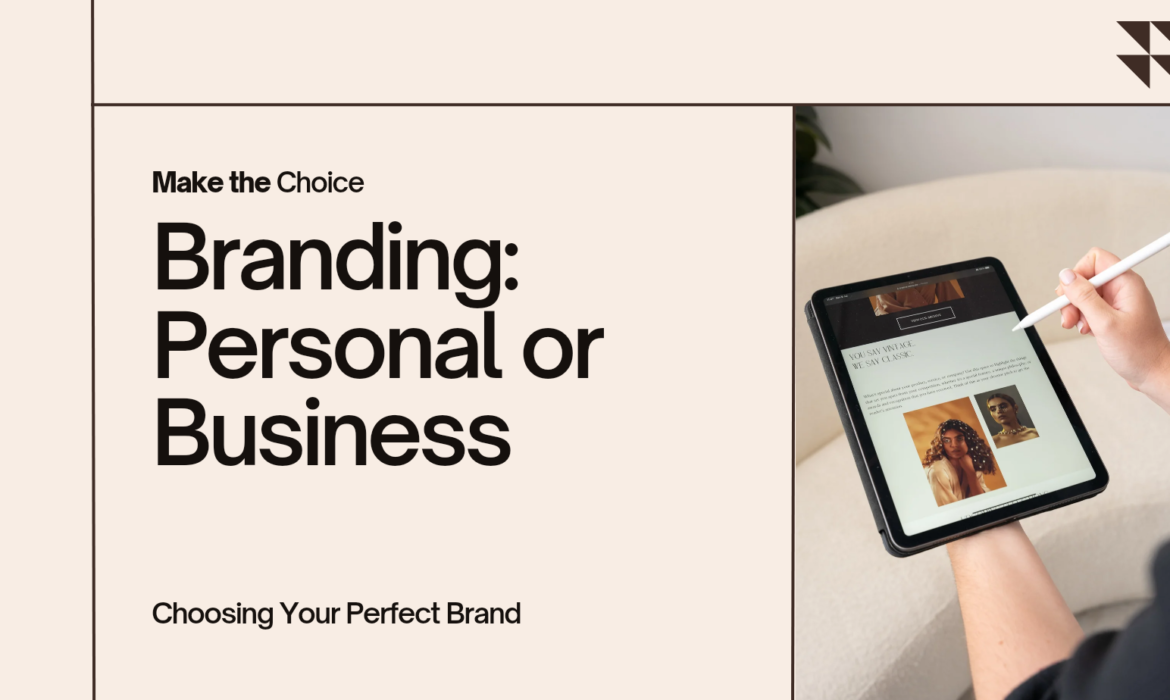081-4797-7173
Branding is more than just a logo or a catchy tagline, It is the personality and promise behind a business. Whether you are a solopreneur or leading a growing company, choosing the right branding strategy can make or break your connection with your audience.
For many business owners, the big question is: should I focus on personal branding or business branding? The decision isn’t always straightforward. Personal branding centres on showcasing you, the individual, while business branding focuses on creating a distinct identity for your company. Both approaches have their strengths and weaknesses, and the best choice often depends on your goals, audience and industry.
In this article, we will review the differences between personal and business branding, as well as their benefits, and help you determine the right strategy for your business.
What is Personal Branding?
Personal branding is all about you. It’s how you present yourself, your skills, and your personality to the world. It’s not just for influencers or celebrities; it is for anyone who wants to make an impression. Entrepreneurs, freelancers, and even small business owners can use personal branding to stand out.
When you build a personal brand, people connect with the person behind the business. They see your values, your expertise, and your unique approach. This builds trust, which is often the foundation of long-lasting relationships. For example, many professionals use platforms like LinkedIn, Instagram, or even YouTube to showcase their personal brand. They share their knowledge, tell their story, and connect directly with their audience.
The main advantage of personal branding is its flexibility. Your brand grows with you. If you switch industries or expand your skills, your personal brand adapts naturally. This makes it especially useful for professionals or entrepreneurs who plan to evolve.
However, personal branding requires constant attention. You’re always in the spotlight, and that can be challenging. It’s also closely tied to your reputation. Any mistakes or controversies can affect how people see your brand. In short, personal branding is ideal if you want to build strong, personal connections with your audience.
What is Business Branding?
Business branding is about creating a strong identity for your company. Unlike personal branding, which focuses on you, business branding puts the spotlight on the company itself. It’s the combination of your company’s name, logo, voice, values, and reputation.
A well-crafted business brand gives your company a professional and polished image. It tells customers what your business stands for and what they can expect when they engage with it. For instance, brands like Apple and Coca-Cola have built powerful identities that customers immediately recognise. They aren’t tied to any one person but represent the company’s mission and values.
One of the biggest benefits of business branding is scalability. It grows with your company, even if the team expands or leadership changes. Unlike personal branding, which depends on one individual, a business brand has a life of its own. This makes it a good choice for businesses aiming for long-term growth.
Business branding also helps build trust. Customers are more likely to buy from a company that feels established and credible. However, business branding can sometimes feel impersonal. It takes extra effort to connect with customers on an emotional level. This is why many successful companies incorporate things like storytelling and customer engagement to bridge the gap.
In summary, business branding is perfect for companies aiming to build a distinct, professional identity. It works best for businesses with multiple team members, product lines, or plans for expansion.
Differences Between Personal Branding and Business Branding
Now that we’ve explored what personal and business branding entails, let’s compare them side by side. While both aim to create a strong identity, their focus, approach, and long-term implications differ significantly.
Focus
Personal branding revolves around you. It highlights your personality, values, and expertise. Customers engage because they trust and relate to the person behind the brand.
In contrast, business branding is all about the company. It focuses on building a corporate identity that customers can trust. The emphasis is on products, services, and the overall mission of the business rather than any single individual.
Scalability and Sustainability
Personal branding thrives on flexibility but can face challenges as a business grows. If your brand relies entirely on your presence, scaling up or stepping away may be impossible. For example, if you take a break, the business may slow down because it’s tied directly to your involvement.
Business branding, however, is built for growth. It creates a structure that allows multiple people, teams, or even future leaders to represent the brand. This makes it ideal for companies aiming to expand or operate independently of the founder.
Customer Connection and Trust
Personal branding often breeds stronger emotional connections. Customers feel like they know you and are more likely to engage because of that human connection. It’s particularly effective in industries where trust and relatability are important, such as coaching or consultancy.
On the other hand, business branding builds trust through professionalism and consistency. Customers trust the brand because of its reputation, quality, and reliability and not necessarily because of the people behind it.
Longevity
While personal branding can evolve with you, it may lose relevance if you shift focus or retire. Business branding, however, can endure beyond an individual’s career, ensuring continuity and legacy.
These differences make it clear that personal and business branding serve different purposes. Neither is better than the other; it all depends on your goals and the nature of your business.
When Should You Choose Personal Branding?
Personal branding is the way to go when your business is closely tied to your expertise or personality. For instance, if you’re a coach, consultant, or public speaker, people are hiring you for your skills and insights. A personal brand makes it easier for potential clients to trust you because they can see the person behind the business. Sharing your story, values, and vision creates a deeper bond that is hard to achieve with a corporate identity.
Personal branding also shines when authenticity matters. It allows you to showcase your unique traits, making it easier to stand out in competitive industries.
Another reason to choose personal branding is flexibility. If your business evolves or changes direction, your brand can adapt with you. For example, if you start as a fitness coach but later venture into motivational speaking, your personal brand can grow to encompass both areas.
However, personal branding does come with challenges. It requires constant visibility and involvement. You’ll need to stay active on social media, engage with your audience, and manage your reputation carefully.
When Should You Choose Business Branding?
Business branding is the right choice when your company’s identity matters more than yours. It’s ideal for organisations with multiple team members, diverse product lines, or long-term growth plans. If you’re building a business that you want to run independently of your personal involvement, business branding sets the foundation.
For instance, if you are running an e-commerce store, a manufacturing company, or a tech start-up, your customers are more likely to connect with your brand than with you personally. They want to trust the quality of your products and the professionalism of your services—not necessarily the person behind them.
Business branding also makes it easier to scale. As your company grows, the brand can stand on its own, even if leadership or team members change. This is particularly important for businesses with big ambitions, ensuring consistency and credibility over time.
Another advantage is that business branding creates a more formal image. It signals professionalism, which helps build trust, especially with larger clients or investors. For example, brands like Coca-Cola or Microsoft have identities that are much bigger than any one person. Their branding focuses on values, innovation, and quality, which appeals to a wide audience.
However, business branding can sometimes feel less personal. To overcome this, companies often incorporate human elements into their campaigns. This adds warmth and relatability to a structured corporate identity.
Blending Personal and Business Branding
Sometimes, the best strategy isn’t choosing between personal and business branding—it may be combining the two. Many successful entrepreneurs and companies strike a balance by leveraging both. This hybrid approach allows you to connect personally while building a strong corporate identity.
For example, many founders use personal branding to build trust and attract customers while developing a business brand that operates independently. Elon Musk, for instance, is a powerful personal brand, but companies like Tesla and SpaceX thrive on their own merits. Customers trust the business because of his influence but don’t rely solely on his involvement.
Blending the two works especially well in industries where personal connection matters, but scalability is also essential. Here’s how to do it effectively:
Use Your Story to Humanise Your Brand
Share your journey and vision as the founder to make your business more relatable. Highlight how your personal values align with your company’s mission. This creates an emotional connection that helps customers resonate with you and your business.
Keep the Brand Bigger Than You
While personal branding can bring attention to your business, ensure the company’s identity isn’t entirely tied to your name. Develop a unique logo, consistent messaging, and a professional website. This makes the business feel established and independent.
Build a Team to Represent the Brand
As your business grows, train team members to represent the brand’s values and vision. This ensures that even if you step back from the spotlight, the company remains strong and credible.
Stay Consistent
Make sure your personal and business brands complement each other. If your personal brand emphasises innovation, your business branding should reflect that. Consistency strengthens both identities and creates a seamless experience for your audience.
This blended approach offers the best of both. You can enjoy the personal connection of being the face of your brand while building a business that thrives on its own.
Conclusion
Choosing between personal and business branding or blending the two is a decision that depends on your goals and the nature of your business. Personal branding offers authenticity, emotional connection, and flexibility, making it ideal for individuals who are the face of their enterprise. Business branding, on the other hand, provides scalability, professionalism, and long-term growth potential.
If you’re unsure, consider a hybrid approach. This lets you leverage the strengths of both strategies while creating a balanced identity for you and your company. The key is to remain authentic and consistent, ensuring your audience can trust and connect with your brand.
Now, over to you! Which branding approach resonates most with your business? Share your thoughts in the comments below, we’d love to hear from you.
0






